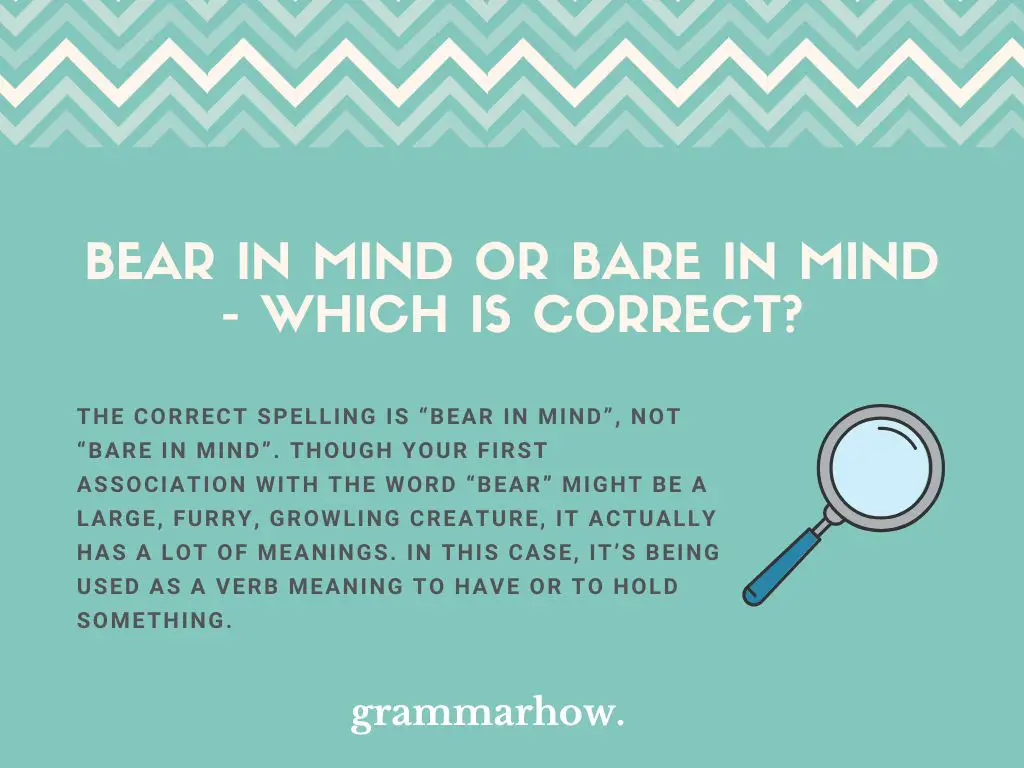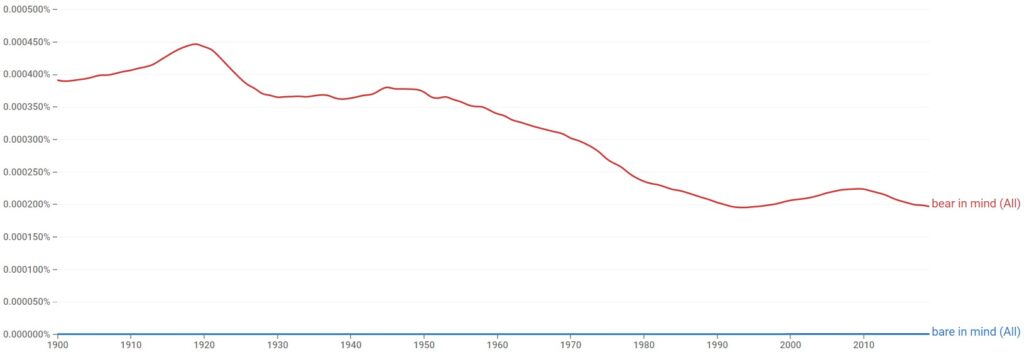We learn new information every single day. Lots of it is pointless to us and will almost immediately be forgotten.
However, some bits are important and need to be paid attention to. This is stuff that we want to bare in mind. Or should that be bear in mind?
Bear in Mind or Bare in Mind – Which Is Correct?
The correct spelling is “bear in mind”, not “bare in mind”. Though your first association with the word “bear” might be a large, furry, growling creature, it actually has a lot of meanings. In this case, it’s being used as a verb meaning to have or to hold something.

When we say that we’re going to bear something in mind, we’re saying that we’re going to remember it and stay aware of it.
This essentially means that we are holding that bit of information inside of our brains. That we will continue to have awareness of it.
“Bare” has a couple of definitions too. It can mean that something is uncovered or unclothed but can also refer to stuff being only the basics, e.g.:
- We’re going to pack the bare minimum for this trip.
With either of these definitions, it wouldn’t make sense for how we use the phrase “bare in mind”.
Spelled this way, it would indicate either that your brain is empty or only contains the most basic information.
This is almost the opposite of what “bear in mind” means, as it shows that we’re keeping an additional bit of information in our brains.
Bear in Mind
To “bear in mind” is to be considerate and mindful of a piece of information.
The phrase is often given as an instruction. For example:
- When you’re organizing her bachelorette party, bear in mind that she doesn’t really like drinking.
Here, the speaker of the sentence is asking a person to remember the fact that the “her” being spoken of doesn’t like drinking, and to consider that fact in all of the plans they make.
“Bear” in this instance is being used as a verb meaning to hold. So, when you “bear in mind”, it means you’re holding something in your mind.
Here are some more examples of how it can be used in a sentence:
- Before you say anything, please bear in mind that I told you to only bother me in an emergency.
- When you planned this trip, did you bear in mind that she was allergic to sunlight?
- If you’re picking restaurants, bear in mind that Danielle can’t eat garlic.
- I admire your courage but bear this in mind, she is ancient and stronger than you know.
- Bear in mind that I will bite you if you annoy me again.
Bare in Mind
“Bare in mind” is an incorrect variant of the phrase “bear in mind”, which means to keep something in consideration.
This is a phrase that often confuses people, possibly because they associate “bear” with grizzly mammals. However, “bear” also means to have or to hold something.
Here are some examples of how you absolutely shouldn’t use this phrase in a sentence:
- Incorrect: Before you say anything, please bare in mind that I told you to only bother me whenever you want.
- Incorrect: When you planned this trip, I hope you didn’t bare in mind that she’s allergic to sunlight.
- Incorrect: If you’re picking restaurants, bare in mind that Danielle can’t eat literally anything.
- Incorrect: I admire your courage but bare this in mind, I don’t actually think she’ll be that hard to fight.
- Incorrect: Bare in mind that I will gently stroke your face if you annoy me again.
Do People Often Use “Bare in Mind”?
As it is incorrect, people don’t often use “bare in mind” in published works.
If we check the Google Ngrams Viewer, we can see that the phrase very rarely appears and is easily surpassed by its correct variation: “bear in mind”.

However, it is a common mistake for people to make in everyday writing, so don’t feel too bad about it if you’ve used it incorrectly before.
Final Thoughts
The phrase “bare in mind” is incorrect. The correct spelling is “bear in mind”. This is because the phrase means to be considerate of a piece of information, i.e., to hold it in your mind. “Bear” means to hold or carry, while “bare” means uncovered or basic.

Martin holds a Master’s degree in Finance and International Business. He has six years of experience in professional communication with clients, executives, and colleagues. Furthermore, he has teaching experience from Aarhus University. Martin has been featured as an expert in communication and teaching on Forbes and Shopify. Read more about Martin here.
